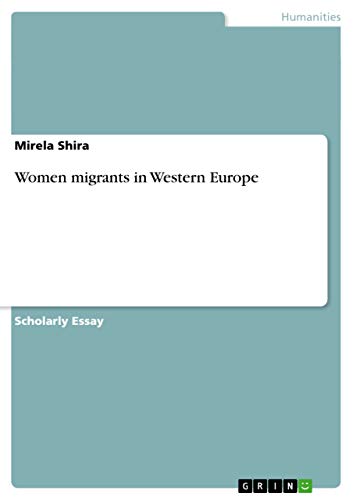Artículos relacionados a Women migrants in Western Europe

"Sobre este título" puede pertenecer a otra edición de este libro.
- EditorialGRIN Verlag
- Año de publicación2012
- ISBN 10 3656295328
- ISBN 13 9783656295327
- EncuadernaciónTapa blanda
- Número de edición2
- Número de páginas20
Comprar nuevo
Ver este artículo
Gastos de envío:
EUR 23,00
De Alemania a Estados Unidos de America
Los mejores resultados en AbeBooks
Women migrants in Western Europe
Descripción Taschenbuch. Condición: Neu. This item is printed on demand - it takes 3-4 days longer - Neuware -Scientific Essay from the year 2008 in the subject Sociology - Political Sociology, Majorities, Minorities, grade: 2, University of Vienna (Institut für den Donauraum und Mitteleuropa), course: Modul Soziologie, language: English, abstract: Eighteen years ago, mobility in eastern and central Europe beyond national frontiers was rare. After the fall of the Berlin wall the migration from East to West was a significant trend in international patterns and mobility.The relation between Eastern and Western Europe has been determined by the intensification of a variety of political, economic, and cultural exchanges between East and West. It is this human mobility, the transnational migration, its physical, cultural, political, subjective and conceptual form of movement, which play a centralrole in these exchanges. We are living now in a world which is organised along multiple axes of mobility, circulation, flows of people and commodities.The number of the migrants and especially that of women migrants has marked an increase in the recent years. The movement of people across Europe is changing the landscape of the continent. The migrants are becoming active subjects to their ownsocial life as well as to legal and political regulation amongst others.Although the majority of the migrants are born in East Europe they are part of the European identity and they are taking responsibility for this transnational space of mediation and exchange called Europe.Apart from countries and cultures there are also spaces of social interaction that determine the establishment of relationships. The transition from state socialism to capitalism has had a huge impact on the lives and the position of the women in Eastern European societies. This political change has been accompanied by theintensification of multi-level communication between the European East and the West. 20 pp. Englisch. Nº de ref. del artículo: 9783656295327
Women migrants in Western Europe
Descripción Taschenbuch. Condición: Neu. Druck auf Anfrage Neuware - Printed after ordering - Scientific Essay from the year 2008 in the subject Sociology - Political Sociology, Majorities, Minorities, grade: 2, University of Vienna (Institut für den Donauraum und Mitteleuropa), course: Modul Soziologie, language: English, abstract: Eighteen years ago, mobility in eastern and central Europe beyond national frontiers was rare. After the fall of the Berlin wall the migration from East to West was a significant trend in international patterns and mobility.The relation between Eastern and Western Europe has been determined by the intensification of a variety of political, economic, and cultural exchanges between East and West. It is this human mobility, the transnational migration, its physical, cultural, political, subjective and conceptual form of movement, which play a centralrole in these exchanges. We are living now in a world which is organised along multiple axes of mobility, circulation, flows of people and commodities.The number of the migrants and especially that of women migrants has marked an increase in the recent years. The movement of people across Europe is changing the landscape of the continent. The migrants are becoming active subjects to their ownsocial life as well as to legal and political regulation amongst others.Although the majority of the migrants are born in East Europe they are part of the European identity and they are taking responsibility for this transnational space of mediation and exchange called Europe.Apart from countries and cultures there are also spaces of social interaction that determine the establishment of relationships. The transition from state socialism to capitalism has had a huge impact on the lives and the position of the women in Eastern European societies. This political change has been accompanied by theintensification of multi-level communication between the European East and the West. Nº de ref. del artículo: 9783656295327

